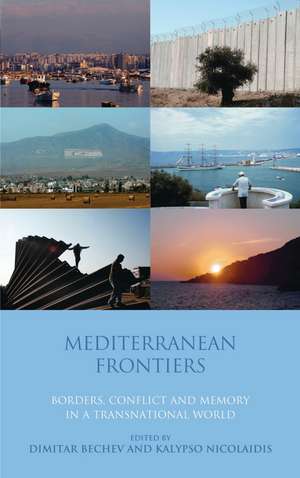Mediterranean Frontiers: Borders, Conflict and Memory in a Transnational World
Autor Dimitar Bechev, Kalypso Nicolaïdisen Limba Engleză Hardback – 4 ian 2010
Preț: 656.06 lei
Preț vechi: 942.87 lei
-30% Nou
Puncte Express: 984
Preț estimativ în valută:
125.54€ • 130.81$ • 103.94£
125.54€ • 130.81$ • 103.94£
Cartea se retipărește
Doresc să fiu notificat când acest titlu va fi disponibil:
Se trimite...
Preluare comenzi: 021 569.72.76
Specificații
ISBN-13: 9781848851252
ISBN-10: 1848851251
Pagini: 264
Ilustrații: maps
Dimensiuni: 138 x 216 x 28 mm
Greutate: 0.48 kg
Editura: Bloomsbury Publishing
Colecția I.B.Tauris
Locul publicării:London, United Kingdom
ISBN-10: 1848851251
Pagini: 264
Ilustrații: maps
Dimensiuni: 138 x 216 x 28 mm
Greutate: 0.48 kg
Editura: Bloomsbury Publishing
Colecția I.B.Tauris
Locul publicării:London, United Kingdom
Notă biografică
Dimitar Bechev is a Research Fellow at the European Studies Centre, University of Oxford.Kalypso Nicolaidis is Professor of International Relations and Director of the European Studies Centre, University of Oxford.
Cuprins
Preface - Thierry FabreIntroduction: Frontiers, Memory and Conflict in the Mediterranean - Dimitar Bechev and Kalypso NicolaidisPART 1: CONSTRUCTING BORDERS AND MEMORIES1. The Ambivalent Sea: Regionalizing the Mediterranean Differently - Kerem Oktem2. Between the Empire and the Nation-State: The Problem of Borders in the Maghreb - Fatma Ben Slimane3. Turkey in the Post-Ottoman Mediterranean: Transcending the 'West' / 'Islam' Binary? - Nora Onar4. The Uses of Empire: Myths and Memories in the Balkans and the Eastern Mediterranean - Dimitar BechevPART 2: REVISITING MEMORIES TO TRANSFORM CONFLICTS?5. Can We Act on Memory in the Mediterranean? The Case of Algeria - Marie-Claire Lavabre and Dimitri Bechev6. 'That Most Beautiful Part of Italy': Memories of Fascist Empire-Building in the Adriatic - Bojan Baskar7. Memory, Conflict and Gender: Women in Black in Israel/Palestine and former Yugoslavia - Franziska BrantnerPART 3: CROSSING BORDERS, CONFRONTING MEMORIES8. Borderlands: The Middle East and North Africa as the EU's Southern Buffer Zone - Raffaella A. Del Sarto9. Borders Besieged: A View on Migration from the European-African Edge10. The Israeli Closure Policies and the Informal Border Economy between the West Bank and Northern Negev (2000-2006) - Cedric Parizot
Recenzii
This book assembles a remarkable group of scholars who together set the study of the Mediterranean in exciting new directions. The contributors tackle the Mediterranean in all its complexity and give equal weight to all its shores. Among the frontiers under consideration, it is the Mediterranean itself that unites Europe, the Middle East and North Africa as a common space of trade, migration and culture. As issues of regional integration grow in importance, this volume will prove essential reading for policy makers and academics alike.
The book contains a significant political discussion about the EU's role in the Mediterranean as well as on region-building as a way of conflict resolution. Whereas most of the existing literature is policy-oriented, a volume which looks at the deeper dynamics of borders and conflicts around the Sea is something to be welcome. The book has an underlying theme[:] that the Euro-Mediterranean Partnership's North-South approach was flawed from the beginning, because it ignored deep-seated differences in cultural values and interpretations of the past among neighbouring Mediterranean countries, be they members or non-members of the EU.
The book contains a significant political discussion about the EU's role in the Mediterranean as well as on region-building as a way of conflict resolution. Whereas most of the existing literature is policy-oriented, a volume which looks at the deeper dynamics of borders and conflicts around the Sea is something to be welcome. The book has an underlying theme[:] that the Euro-Mediterranean Partnership's North-South approach was flawed from the beginning, because it ignored deep-seated differences in cultural values and interpretations of the past among neighbouring Mediterranean countries, be they members or non-members of the EU.
